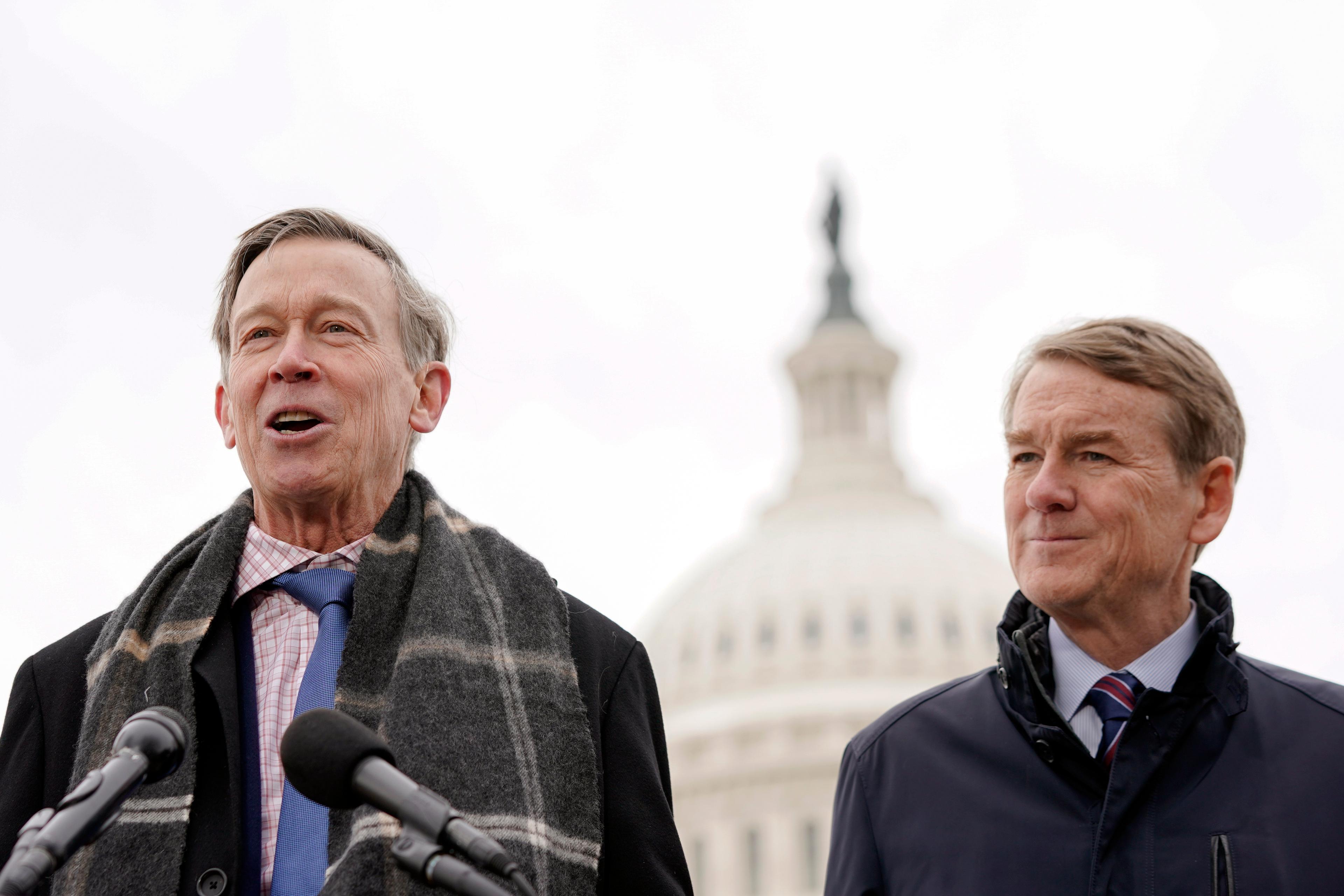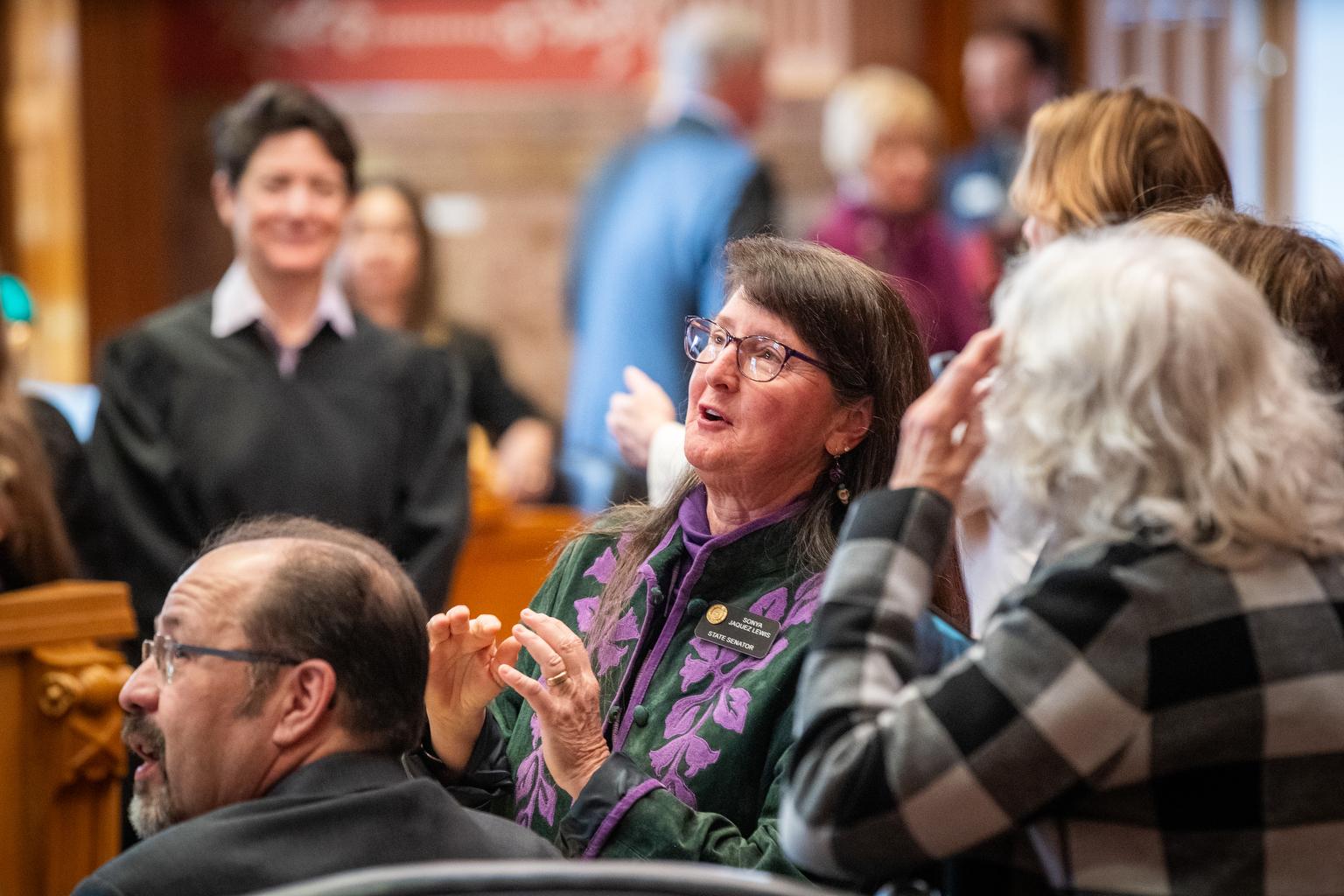
Congressional Republicans notched a major victory, and President Donald Trump will get his July 4th bill signing.
After hours of backroom negotiating, calls with Trump, and votes held open for hours, Trump and House Speaker Mike Johnson were able to muscle through the Republican tax and spending bill — dubbed the “One Big Beautiful Bill” — Thursday by a vote of 218-214. Two Republicans, Rep. Thomas Massie of Kentucky and Rep. Brian Fitzpatrick of Pennsylvania, voted with all Democrats against the bill.
The Colorado House delegation split along party lines.
Republican Reps. Lauren Boebert, Jeff Crank, Gabe Evans and Jeff Hurd voted for the bill, while Democratic Reps. Jason Crow, Diana DeGette, Joe Neguse and Brittany Pettersen voted against it.
“It extends the tax cuts. I think that that’s first and foremost,” said Crank, the Colorado Springs area representative, about the elements of the bill he liked. “It adds $150 billion to national defense, which is sorely needed. It helps provide for border security, more border patrol agents ... I like the fact that it opens up oil and gas leases.”
Among other things, the bill extends the 2017 Trump tax cuts, institutes some temporary new ones like no tax on tips or overtime, includes work requirements to receive Medicaid, has more money for border security and defense, and tries to spur domestic energy production, mainly by expanding exploration, permitting and production of fossil fuels.
The bill is paid for largely by cuts to health care and nutrition programs and changes to student loans. Just over $900 billion would come from cutting Medicaid over a decade, while just over $150 billion in cuts come from changes to the Affordable Care Act marketplace coverage. It’s predicted that about 12 million people could lose health insurance.
It also includes an increase to the debt limit of $5 trillion.
According to the non-partisan Congressional Budget Office, the Senate version of the bill would add $3.3 trillion to the national debt over a decade, compared to the $2.4 trillion the original House version would have.
The Senate passed its bill earlier this week, and House Republicans approved that version Thursday with no changes.
Crank criticized the CBO, saying it has a record of being wrong. But it was not just the CBO that said it would raise deficits and the debt, but other think tanks and academic institutions. Only Trump’s Council of Economic Advisors painted a rosy picture of how this bill will impact debt.
Crank countered, saying, “I think [the bill] will unleash a lot of economic activity.” He added that there will be other chances to cut spending through the appropriations process, rescissions or reauthorizations. “Does every federal agency that’s out there right now, does it all need to be reauthorized?”
“Our country will be significantly deeper in debt in 10 years if this bill were to pass,” said Democratic Gov. Jared Polis during a press conference Wednesday, speaking out against the bill. “And that's why I encourage our Republicans from Colorado as well as from other parts of the country to defeat it.”
For months, Republicans have focused on the positives of the bill, such as funding for border security.
Evans, who has hammered the state for high crime rates and what he says are “sanctuary state” policies, supported the border security funding in the bill. “Being able to have the border security measures in place, being able to actually protect the territorial integrity of the United States from threats like that is critically important.”
A long, difficult vote
In a sign of how toxic the bill might be for the GOP conference for different reasons, Johnson started Wednesday knowing he didn’t have the votes to pass it.
The House set a new record for the longest vote held open as he and the White House negotiated with fiscal hawks, hard-right conservatives, and moderates concerned about Medicaid cuts.
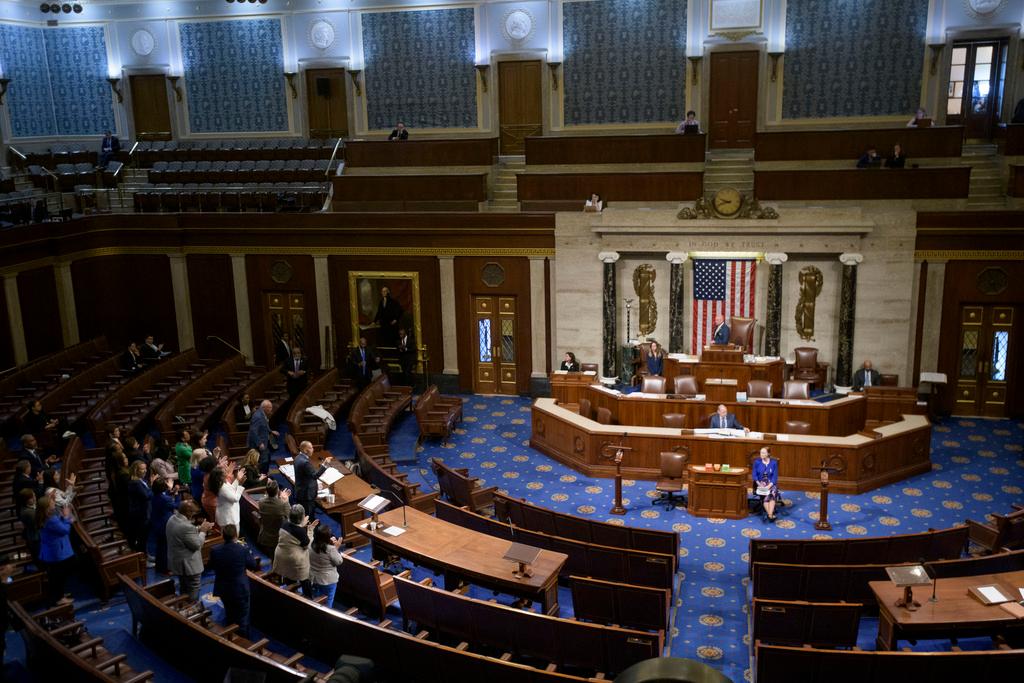
Boebert was part of a group of House Freedom Caucus members who traveled to the White House and later were holed up in a room off the floor to express their concerns with elements of the bill. Earlier in the day, the HFC released a three-page document outlining the problems they had with it.
By the evening, several members of the HFC, including Colorado’s Boebert, said they would not be present for a procedural vote to advance the bill if it was held Wednesday night.
Johnson called their bluff and called for a vote.
Boebert and others quickly changed their tune.
She told reporters that she would vote yes on the procedural vote. “I trust President Trump.”
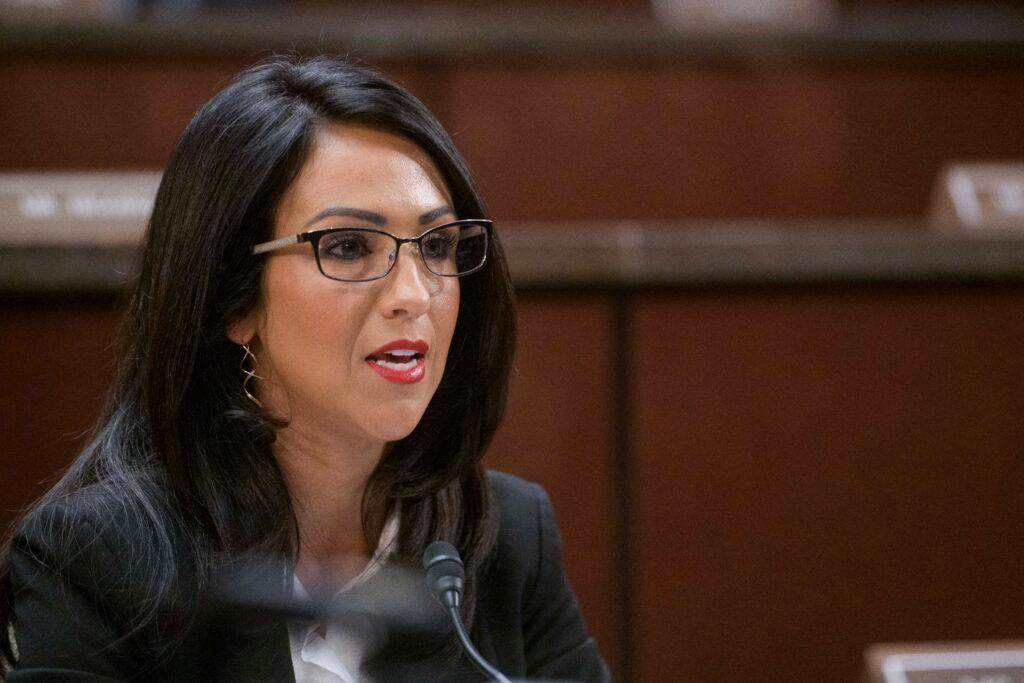
Still a handful of hard-right and moderate Republicans withheld their vote or voted no on the rule until a deal was struck about six hours later. In the end, only one Republican voted no and debate started around 3:30 a.m. ET.
There have been different pain points within the Republican conference over the bill, such as the Senate’s reworked Medicaid provider tax.
Another point of contention was how quickly to phase out clean energy tax credits from former President Joe Biden’s signature climate, health and tax bill, the Inflation Reduction Act.
Evans was one of 13 Republicans who wrote to the Senate asking them to improve the bill when it came to clean energy tax credits. “I think this gives a better runway for people to actually be able to make business decisions,” he said.
The Senate tweaked the text to let certain projects that break ground within a year of the bill’s enactment or will be placed in service by 2027 to access the tax credits. But the Senate version also immediately terminates tax credits for residential clean energy, like installing solar panels.
The House Freedom Caucus, however, wanted to see an end to what they called the “Green New Scam” and came out against the starting construction carve-out. That group also wanted to terminate credits for other clean energy efforts, like battery storage and carbon capture.
Evans noted his district has a lot of all-of-the-above energy production.
“So making sure that we have a level playing field for all of those different forms of energy is critically important to jobs and to all the other things that we need in the district,” he said.
With the bill’s passage, eyes turn to midterm elections
Now that the bill is set to become law, Republicans will try to sell it to a dubious public.
That task will be made harder by Democrats, who have focused on the safety net cuts in the bill and how they will help fund benefits for the wealthiest Americans.
Republicans will get some help from the bill. It was formulated to put cash in people’s pockets up front, such as the no-tax-on-tips provision, while the cuts to Medicaid and SNAP will hit after 2026 or in some cases as late as 2028.
Colorado Republicans have said they’re protecting Medicaid and SNAP and are just rooting out “waste, fraud and abuse.”
But the bill gets savings from people losing Medicaid coverage, in part by increasing the paperwork associated with the program and making it more difficult for people to keep coverage.
For months, Democrats have hammered Republicans about the cuts, and that continued right up until the final passage vote.
Democratic Leader Hakeem Jeffries of New York used his floor time to read from letters from ordinary Americans across the country, including Colorado, who are concerned about how the bill will impact them.
Jeffries read a letter from a woman named Ashley in Hurd’s 3rd Congressional District about how the Affordable Care Act helped her due to its coverage of pre-existing conditions. She wrote that before the ACA, she had to choose between medication or paying the rent.
“The United States of America is the wealthiest country in the history of the world, not a single hard-working American taxpayer should ever have to choose between food or medicine or rent or putting clothing on their back,” Jeffries said after reading her story.
“The OBBB will ensure Medicaid is protected for the vulnerable populations it was created to protect,” Hurd said in response to the letter. “I look forward to hearing from my constituents about their concerns and working with them to address these issues.”
Hurd’s congressional district has the highest number of Medicaid recipients out of the Colorado districts and Democratic groups had been urging him to vote against the bill.
Colorado’s swing-seat representative, Evans, was also a target for Democrats. He won his seat by fewer than 2,500 votes.
Jeffries read a letter from Daniella in Evans’ 8th Congressional District. That letter said Medicaid was a “lifeline” for her autistic 5-year-old daughter. She said her family struggles taking care of their children and running their business.
“Medicaid has provided therapy and services that have made a world of difference in her life ... Medicaid has helped us give her the opportunities she deserves and millions of other children in the United States,” Jeffries read from Daniella’s letter.
Evans’ office wanted to see the letter and the specific cut Daniella was worried about before commenting.
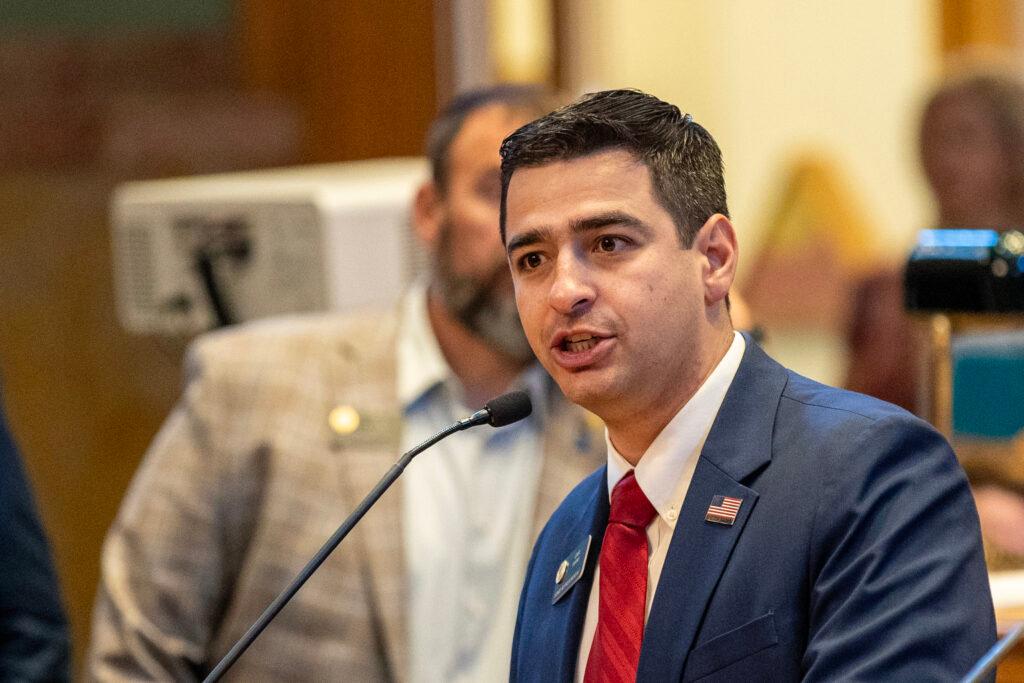
Democratic Caucus Chair Pete Aguilar also called out Evans by name at a press conference Wednesday. “Why would Gabe Evans of Colorado vote for this bill?” Aguilar asked rhetorically. “Twenty-nine thousand people will lose access to health care in his district. Thirty thousand households will lose access to food nutrition programs and almost a thousand energy jobs will be lost.”
Colorado Democrats have been pointing out the harm they believe the bill will do to the state.
“The Senate bill is far worse. The cuts to food assistance are more draconian. The cuts to health care are more cruel,” said Democratic Rep. Joe Neguse. “And in particular, the new formula that they have adopted with respect to hospital provider fees would devastate rural hospitals in our state, upwards of potentially eight hospitals in Western Colorado and southern Colorado would close nursing facilities.”
Neguse highlighted the Senate bill’s provision to phase down the Medicaid provider tax, a tax on health care providers that states use to fund Medicaid. Without it, rural hospitals could be left holding the bag and have to close. Senate Republicans created a $50 billion fund to help rural hospitals from service reduction or closure.
Democratic Rep. Diana DeGette called it the worst bill she’s ever seen in all her years in Congress.
She noted that more than 1.2 million Coloradans are covered by Medicaid.
“A disproportionate number of those people are in Western Colorado and they are in northern Colorado, and under the Senate version, over 377,000 Coloradoans would lose their coverage,” she said.
And despite Republicans arguing that they are not cutting Medicaid but adding to it, Crow countered, “They can’t take a trillion dollars out of the American health care system and not have hospital closures, clinic closures, doctors and nurses leaving the system.”
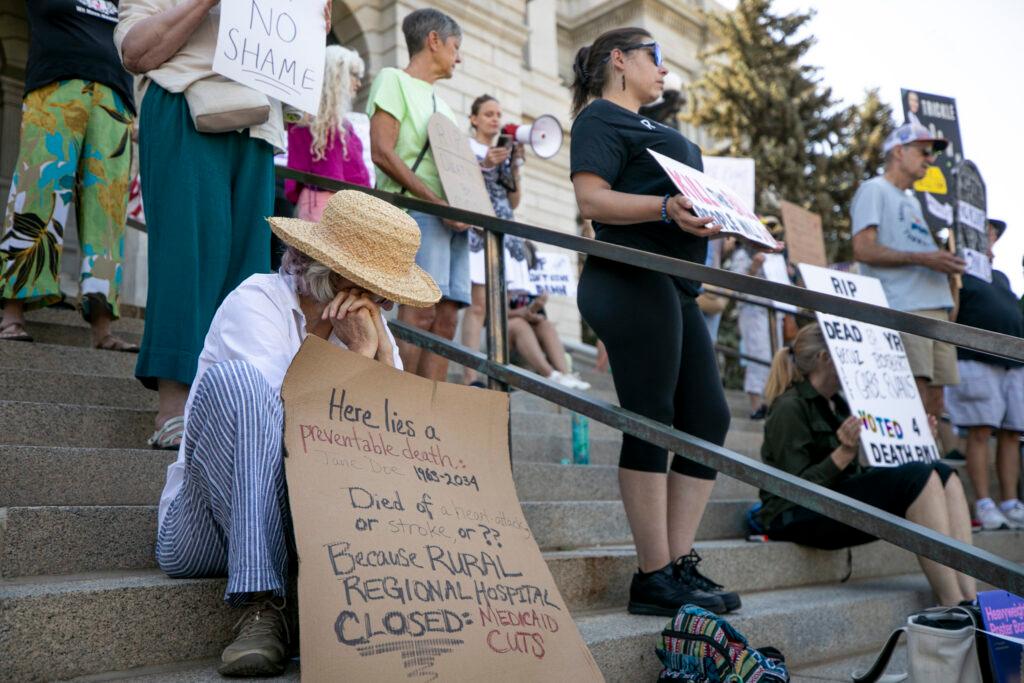
Pettersen highlighted a Medicaid waiver to treat substance use disorder that will be taken away through the bill. Pettersen has been public about her mother’s struggles with substance abuse and how Medicaid helped.
“It's hard to hold back tears when I think about my mom, who works a low-wage job, who would be unable to have access to care. We're leaving people like her behind,” she said.
Health care is also an issue that voters feel right off the bat when changes are made.
The last time a party (the Democrats) changed the social safety net (Affordable Care Act), it led to a backlash at the polls at the next election, even before the policy went into effect.
That’s a scenario Republicans are hoping to avoid.
Editor's Note: This story was updated to include Rep. Jeff Hurd as one of the Republicans who voted for the bill. Due to a typo, he was left off initially while Rep. Jeff Crank was listed twice.

